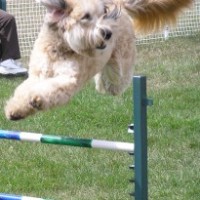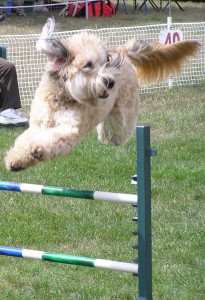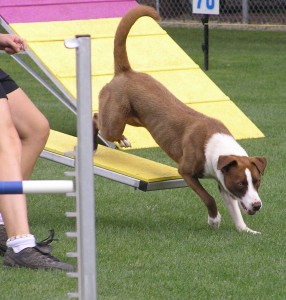
 We’ve all been there before, whether it’s giving a presentation at work, watching our sons and daughters step up to the plate at a key moment in their baseball game, or when you hear your name called to move to the start line for your jumpers run. It hits you like a sledgehammer to the gut. The bottom falls out of your stomach and your legs feel like jelly. In your head you ask “Why do I do this to myself?”
We’ve all been there before, whether it’s giving a presentation at work, watching our sons and daughters step up to the plate at a key moment in their baseball game, or when you hear your name called to move to the start line for your jumpers run. It hits you like a sledgehammer to the gut. The bottom falls out of your stomach and your legs feel like jelly. In your head you ask “Why do I do this to myself?”
What you’re experiencing is high levels of anxiety and for most agility handlers, it can be the harbinger of a disastrous run. A certain amount of anxiety is a good thing. It sends a signal to your body that you’re about to compete. It gets your heart rate up and increases your alertness. We like to call this butterflies. It’s a cute name and a treat to try to explain to an inquisitive 4-year old.
“No, no, there aren’t real butterflies in your tummy. No, you can’t see them. No they won’t fly out when you open your mouth.”
However, when the amount of anxiety that you’re experiencing exceeds your coping skills, the cute “butterflies” turn on their host and start eating your gut from the inside. You’re now in panic mode and your performance, well, it ain’t so great.
Getting a handle on your anxiety and developing your coping skills so that you don’t find yourself in a situation where your anxiety is greater than what you can handle is a key to boosting your performance and improving your consistency. The first step is understanding what can cause you to become anxious. This knowledge will then let you direct your mental training for maximum benefit.
Two things (principles) will make you anxious:
- The uncertainty of an event.
- The importance of an event.
Let’s tackle the uncertainty of an event first. What we’re concerned with here is the likelihood of a specific outcome. In a team sport like hockey, we would focus on the chance each team has at winning a game. If we play on a very strong team and we play a very weak team, the outcome is pretty clear – we’re going to win. No nerves here.
If the roles were reversed, we play on a very weak team and our opponents are strong, again, no nerves, we’re not supposed to win. It doesn’t matter if we make lots of mistakes, we’re going to lose either way.
Now if we play a team that is of similar skill level, the winner of the game is uncertain regardless if both teams are very strong or very weak. In these kinds of games the nerves kick in and we feel that any mistake during the game could cause us to lose.
How does this apply to agility?
 While you’re not directly competing against another team, the uncertainty principle often comes into play when you consider your dog’s obstacle performance and your teamwork (e.g., your dog’s ability to read your handling cues). The key is consistency. If your dog is consistent – either consistently poor or hopefully, consistently great, then there is little uncertainty and little anxiety. If your dog is inconsistent, that’s when you find yourself on course wondering if the dog will properly read your rear cross or hit its contacts. Big time nerves!
While you’re not directly competing against another team, the uncertainty principle often comes into play when you consider your dog’s obstacle performance and your teamwork (e.g., your dog’s ability to read your handling cues). The key is consistency. If your dog is consistent – either consistently poor or hopefully, consistently great, then there is little uncertainty and little anxiety. If your dog is inconsistent, that’s when you find yourself on course wondering if the dog will properly read your rear cross or hit its contacts. Big time nerves!
The second principle is the importance of an event. More specifically, how important an event is to you. The more important an event, competition, or even practice is to you, the more anxiety you will experience. Simply, your performance matters more to you at big events.
There are many things that can impact the importance of an event and it’s different for every individual. I’ll list a few examples below but there are many, many others.
- national championship vs. local trial
- many spectators vs. few spectators
- first run of the day vs. other runs that same day
- title run (i.e., if your clean this run you earn a title) vs. non-title run
- presence or absence of a person whom you value their opinion (e.g., coach)
Adding together these two principles, you can predict the amount of anxiety you experience at any given time. While I’ve mostly discussed agility, the context of the event really doesn’t matter.
For example, before a presentation for work, ask yourself how prepared are you to give your talk. This will give you an idea of the uncertainty of the event. Well prepared, less anxiety. Poorly prepared, more anxiety. Is this a routine presentation to your team or will the boss’s boss and his colleagues be sitting in? Is this presentation important to you? Once you’ve got an idea about what’s underlying your anxiety, you can get to work on developing the coping skills to control it and make it work for you.
Don’t be shy! Write in the comments. What situations give you the butterflies? How do you try to cope with them?
Leave A Reply (3 comments so far)
The comments are closed.
Penny
15 years ago
I am just thrilled that I am not the only one, I guess I just
have to get better at controlling the butterflies.
John Cullen
15 years ago
I still get butterflies before I hit the ice for my men’s league games. I use it to get energized. Hockey for old guys can be pretty slow and the little bump I get from them makes the games more enjoyable.
Kristi
13 years ago
I get butterflies even when I’m trying to mentally prepare for a ‘big’ competiton (ie: nationals, worlds, qualifiers). I always thought of them as positive; sort of a prelude to the exciting adventure we’re about to embark upon.
But then there’s the other kind. The, oh my gosh, this is my last chance to make it right butterflies. Some carefully chosen music in the earbuds, and some calm breathing help a lot. But… I worry that as I quiet my own mind, I’m actually indirectly calming my dog down when I need his energy level to be boundless.